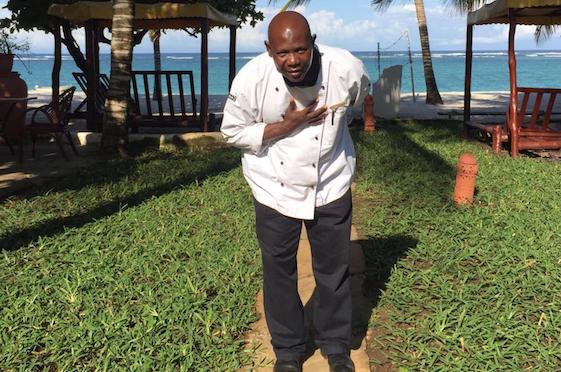At the AfroChic Hotel on the Indian Ocean, 40% of visitors are repeat customers. While the entire staff is known for warm and attentive service, perhaps no one embodies this hotel’s hospitality than its executive chef, Mwatumu Masoud.
“He has this way about him,” says Heath Dhana, director of operations for the Elewana Collection, which operates the hotel on Diani Beach, Kenya. “If you’ve had a lazy breakfast, and it’s before lunchtime, possibly around 11 o’clock or so, he will come to you with a platter of some samosas that he’s freshly made with feta and coriander. They’re crisp and just freshly fried, and it’s as if he anticipated that you needed this snack. You didn’t order it, but it just comes.”
Masoud greets guests personally as they arrive at the hotel. “We have this time to get to know all of our guests,” says Joab Andayi, general manager of AfroChic. “That creates a good beginning, and he gets to know our guests.”

Contributed by Jeanette Hurt
Masoud, a native Kenyan who attended culinary school before working his way up through Kenyan kitchens, says part of his inspiration comes directly from his customers. “For a new dish, I normally go to my guests and talk with them – what does excite them? – and then I go from there,” he says. “I have different recipes for different guests. Some like thing spicy, and sometimes they don’t. It’s a very intimate property, and since you have a chance to meet with them upon their arrival, you already know a good amount about them.”
Masoud says he tries to embody the spirit of the hotel, which is to make the guests feel at home. “I know them, and they know me,” Masoud says. “I love the interaction with the guests daily, knowing their needs. It starts with knowing their cravings and tastes. Many of my guests are repeat, and they send me emails like ‘Can I have the crab cake?’ Then, when I make them what they want, they say ‘Oh, Masoud, you are here, you remember my prawn samosa!’”
Guests stay at AfroChic an average of five to seven days, and in the winter season, some stay for as long as three or four weeks, Andayi says. They can eat at any time of day or night, in practically any part of the hotel. “When the chef pops up with a surprise bite of samosas, these interactions are what make guests always want to come back,” Andayi says.
Besides creating signature dishes and remembering preferences, Masoud says he teaches his guests to make his dishes.
“One dish we call steamed fish in banana leaf, but my guests don’t have banana leaves where they’re from,” Masoud says. “It makes no sense for them to carry that recipe home. So, I help them… I give them the same recipe, but they can use foil paper instead of banana leaves. I often share my cooking knowledge and recipes by emails.”
But for some guests, teaching is a memorable experience and one that Masoud has made into a tradition. If a larger group of families or friends are visiting, or if there are couples who are interested, he will set up a friendly, outdoor cooking competition called koroga, which in Swahili means “mixing.”
The koroga is held on the hotel’s garden deck, and it usually features dishes that don’t take a long time to cook – like stir fries or curries. “The chef is kind of a referee, but he’s also a teacher,” Andayi says. “It’s a competition, but it’s also a class, and chef guides them through the process. We have one family who comes every December, and the main thing they want to do is the koroga.”
Masoud is inspired by cookbooks and discovering new ingredients, but also by the fresh ingredients he gets locally, especially seafood. Every morning, he meets with local fishermen to select which of their catch he will cook that day. “I’m normally there with them by 6 o’clock when they’ve come in,” he says.
Having such a popular chef on staff helps retain customers. “In Kenya, we have a large international community who lives in Nairobi, and they love to come to the coast for vacation,” Andayi says. “We also have a large Indian community here, and they love traveling, but I can tell you, if you ruin their food, you ruin their vacation. One of the main reasons they will come back to your hotel is if you have a great chef.”
